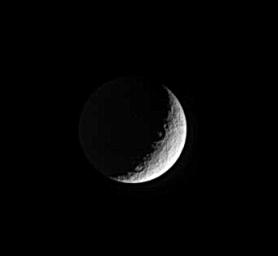
|
Rhea’s Crescent
- Click the image above for a larger view
- Full-Res JPEG (346 x 319) (3.5 kB)
- Full-Res TIFF (346 x 319) (25.7 kB)
Caption:
Two large craters lie along the boundary between day and night on Saturn's moon Rhea. The bright spots in the middle of each crater may be prominent central peaks. Rhea is 1,528 kilometers (949 miles) across.
This view shows principally the trailing hemisphere on Rhea. The image has been rotated so that north on Rhea is up.
The image was taken in visible light with the Cassini spacecraft narrow-angle camera on Jan. 19, 2005, at a distance of approximately 1.9 million kilometers (1.2 million miles) from Rhea and at a Sun-Rhea-spacecraft, or phase, angle of 121 degrees. Resolution in the original image was 11 kilometers (7 miles) per pixel. The image has been contrast-enhanced and magnified by a factor of two to aid visibility.
Background Info:
The Cassini-Huygens mission is a cooperative project of NASA, the European Space Agency and the Italian Space Agency. The Jet Propulsion Laboratory, a division of the California Institute of Technology in Pasadena, manages the mission for NASA's Science Mission Directorate, Washington, D.C. The Cassini orbiter and its two onboard cameras were designed, developed and assembled at JPL. The imaging team is based at the Space Science Institute, Boulder, Colo.
For more information about the Cassini-Huygens mission, visit http://saturn.jpl.nasa.gov and the Cassini imaging team home page, http://ciclops.org .
Cataloging Keywords:
| Name | Value | Additional Values |
|---|---|---|
| Target | Rhea | |
| System | Saturn | |
| Target Type | Satellite | |
| Mission | Cassini-Huygens | |
| Instrument Host | Cassini Orbiter | |
| Host Type | Orbiter | |
| Instrument | Imaging Science Subsystem (ISS) | |
| Detector | Narrow Angle Camera | |
| Extra Keywords | Crater, Grayscale, Rotation, Visual | |
| Acquisition Date | ||
| Release Date | 2005-03-07 | |
| Date in Caption | 2005-01-19 | |
| Image Credit | NASA/JPL/Space Science Institute | |
| Source | photojournal.jpl.nasa.gov/catalog/PIA06599 | |
| Identifier | PIA06599 | |
